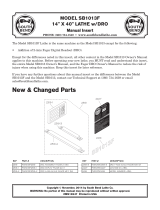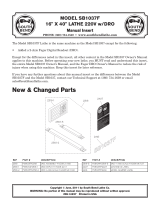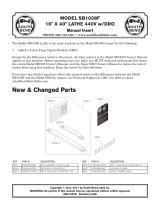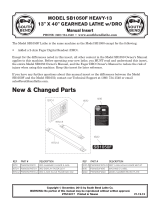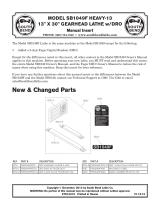Good Working Practices/Safety
The following suggestions will enable you to observe good working practices, keep yourself and fellow
workers safe and maintain your tools and equipment in good working order.
WARNING!! KEEP TOOLS AND EQUIPMENT OUT OF THE REACH OF YOUNG CHILDREN
Mains Powered Tools
Primary Precautions
Primary Precautions
These machines are supplied with a moulded 13 Amp. Plug and 3 core power cable. Before using the
machine inspect the cable and the plug to make sure that neither are damaged. If any damage is visible
have the machine inspected/repaired by a suitably qualified person. If it is necessary to replace the plug, it
is preferable to use an ‘unbreakable’ type that will resist damage. Only use a 13 Amp plug, make sure the
cable clamp is tightened securely. Fuse at 13 Amp. If extension leads are to be used, carry out the same
safety checks on them, and ensure that they are correctly rated to safely supply the current that is required
for your machine.
Work Place/Environment
The machine is not for working outside,do not use when or where it is liable to get wet. If machine does get
wet; dry it off as soon as possible, with a cloth or paper towel. Do not use 240va.c. powered machines
anywhere within a site area that is flooded or puddled, and do not trail extension cables across wet areas.
Keep the machines clean; it will enable you to more easily see any damage that may have occurred. Clean
the machine with a damp soapy cloth if needs be, do not use any solvents or cleaners, as these may cause
damage to any plastic parts or to the electrical components.
Keep the work area as well lit and uncluttered as is practical, this includes personnel as well as
material.
(Under no circumstances should CHILDREN be allowed in work areas)
It is good practice to leave the machine unplugged until work is about to commence, also make sure to
unplug the machine when it is not in use, or unattended. Always disconnect by pulling on the plug body and
not the cable. Once you are ready to commence work, remove any tools used in the setting operations
(if any) and place safely out of the way. Re-connect the machine.
Carry out a final check e.g. check the cutting tool, drill bit etc. is securely tightened in the machine, check
you have the correct speed and function set, check that the power cable will not ‘snag’ etc.
Make sure you are comfortable before you start work, balanced, not reaching etc.
If the work you are carrying out is liable to generate flying grit, dust or chips, wear the appropriate safety
clothing, goggles, gloves, masks etc. If the work operation appears to be excessively noisy, wear ear-
defenders. If you wear your hair in a long style, wearing a cap, safety helmet, hairnet, even a sweatband,
will minimise the possibility of your hair being caught up in the rotating parts of the tool, likewise,
consideration should be given to the removal of rings and wristwatches, if these are liable to be a ‘snag’
hazard. Consideration should also be given to non-slip footwear, etc.
Do not work with cutting or boring tools of any description if you are tired, your attention is wandering or
you are being subjected to distraction. A deep cut, a lost fingertip or worse; is not worth it!
Do not use this machine within the designated safety areas of flammable liquid stores or in areas where
there may be volatile gases. There are very expensive, very specialised machines for working in these
areas, THIS IS NOT ONE OF THEM.
Check that cutters, drills etc., are the correct type and size, are undamaged and are kept clean and sharp,
this will maintain their operating performance and lessen the loading on the machine.
Above all, OBSERVE…. make sure you know what is happening around you, and USE YOUR COMMON
SENSE.
!
General Instructions for 240v Machines
!
04





















